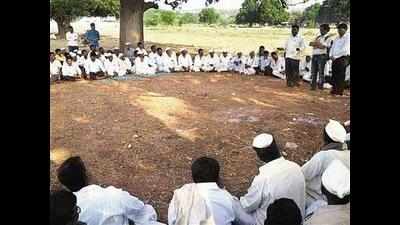- News
- City News
- chandigarh News
- Gujjars rise against repression of ritual
Trending
This story is from July 12, 2016
Gujjars rise against repression of ritual

(Representative image)
CHANDIGARH: Gujjars in Haryana have launched a campaign against 'feast after death' ritual, which may give relief to the rural community that is already reeling under financial crisis mainly due to adverse weather conditions.
Taking the initiative, a panchayat of the community at Hansi town of Hisar district on Sunday banned the 'mrityu bhoj' (feast after death) function.
The panchayat members said that the initiative has been taken in an attempt to protect the community members, particularly weaker sections, from unnecessary financial burden.
The community members say that they spend as much as Rs 2 lakh to organize a bhoj whenever any old member dies in the family.
The community members initially held a panchayat of 22 villages of Hansi sub-division before holding a large panchayat inviting representatives of 80 villages from five neighbouring districts - Hisar, Fatehabad, Rohtak, Bhiwani and Sirsa - on Sunday.
"As per the old custom, even poor people organize such community lunch," said Kishan. He said they would launch the campaign in other parts of state particularly in Karnal, Panipat, Gurgaon, Faridabad and Mahendergarh where the community has a considerable population before moving to Rajasthan, Uttar Pradesh and Madhya Pradesh.
Death feast is reportedly prohibited in Rajasthan under the Rajasthan Mrityu Bhoj Prevention Act, 1960, and there was a political controversy after it was alleged that several functionaries of the government attended a feast in the state in 2005.
Professor Ranbir Singh, a former dean of social sciences in Kurukshetra University, said the custom is prevalent in almost all sections of the peasantry class in Haryana but it's known with different names. "The Gujjars have taken a good initiative," he added.
Echoing similar sentiments, Ved Prakash Vidrohi, who is president of NGO Gramin Bharat, said the Jats had stopped the practice in some areas of the state. "This is still a big problem in southern Haryana especially in Ahir and Gujjar community. People feel proud when they organize bigger bhoj than their neighbours," he added.
Taking the initiative, a panchayat of the community at Hansi town of Hisar district on Sunday banned the 'mrityu bhoj' (feast after death) function.
The panchayat members said that the initiative has been taken in an attempt to protect the community members, particularly weaker sections, from unnecessary financial burden.
The community members say that they spend as much as Rs 2 lakh to organize a bhoj whenever any old member dies in the family.
"In the panchayat, we reached a consensus to restrain the community members from organizing such bhoj. Initially, we won't impose any fine on the violator, but the family concerned would be requested to follow the new norm. If the family did not obey, then we will boycott the bhoj," said Kishan Pal Gujjar, a professor of history in Hansi's government college and one of the organizers of the panchayat.
The community members initially held a panchayat of 22 villages of Hansi sub-division before holding a large panchayat inviting representatives of 80 villages from five neighbouring districts - Hisar, Fatehabad, Rohtak, Bhiwani and Sirsa - on Sunday.
"As per the old custom, even poor people organize such community lunch," said Kishan. He said they would launch the campaign in other parts of state particularly in Karnal, Panipat, Gurgaon, Faridabad and Mahendergarh where the community has a considerable population before moving to Rajasthan, Uttar Pradesh and Madhya Pradesh.
Death feast is reportedly prohibited in Rajasthan under the Rajasthan Mrityu Bhoj Prevention Act, 1960, and there was a political controversy after it was alleged that several functionaries of the government attended a feast in the state in 2005.
Professor Ranbir Singh, a former dean of social sciences in Kurukshetra University, said the custom is prevalent in almost all sections of the peasantry class in Haryana but it's known with different names. "The Gujjars have taken a good initiative," he added.
Echoing similar sentiments, Ved Prakash Vidrohi, who is president of NGO Gramin Bharat, said the Jats had stopped the practice in some areas of the state. "This is still a big problem in southern Haryana especially in Ahir and Gujjar community. People feel proud when they organize bigger bhoj than their neighbours," he added.
End of Article
FOLLOW US ON SOCIAL MEDIA











